
Politics of Djibouti takes place in a framework of a presidential representative democratic republic, whereby the executive power is exercised by the President and the Government. Legislative power is vested in both the Government and the National Assembly. The party system and legislature are dominated by the socialist People's Rally for Progress. In April 2010, a new constitutional amendment was approved. The President serves as both the head of state and head of government, and is directly elected for single six-year term. Government is headed by the President, who appoints the Prime Minister and the Council of Ministers on the proposal of the latter. There is also a 65-member chamber of deputies, where representatives are popularly elected for terms of five years. Administratively, the country is divided into five regions and one city, with eleven additional district subdivisions. Djibouti is also part of various international organisations, including the United Nations and Arab League.

The Djibouti Armed Forces are the military forces of Djibouti. They consist of the Djiboutian National Army and its sub-branches the Djiboutian Air Force and Djiboutian Navy. As of 2018, the Djibouti Armed Forces consists of 20,470 ground troops, which are divided into several regiments and battalions garrisoned in various areas throughout the country. The Djibouti Armed Forces are an important player in the Bab-el-Mandeb and Red Sea.

The Djiboutian Music refers to the musical styles, techniques and sounds of Djibouti. The first major form of modern Djiboutian music began in the mid-1940s, when Djibouti was a part of the French Somaliland. Djiboutian music is characterized by poetry, so that listening to a Djiboutian song is first paying attention to its meaning. The artist rocks the listeners in the cheerfulness of the refrains and the turn of the sentences. Often sung by a couple, a song is played in the form of a sleight of hand between a man and a woman, one recounting his feelings and his love, even his passion for the other, until the other accepts or rejects this offer.
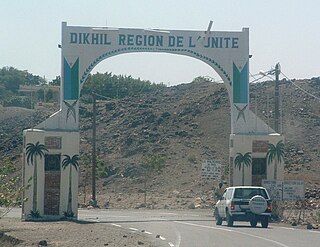
Dikhil is a town in the western Dikhil Region of Djibouti. Lying east of Lake Abbe, It is situated about 122 km (76 mi) southwest of Djibouti City and 12 km (7.5 mi) north of the border with Ethiopia. It serves as the administrative centre of the Dikhil Region, and is home to the Afar and Somali ethnic groups. The town develops gardens and fruit trees.
The Dir is one of the largest and most prominent Somali clans in the Horn of Africa. They are also considered to be the oldest Somali stock to have inhabited the region. Its members inhabit Djibouti, Somalia, Ethiopia, and northeastern Kenya.
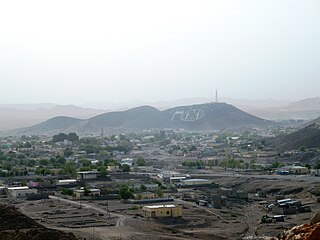
Ali Sabieh is the second largest city in Djibouti. It is situated about 98 kilometres Southwest of Djibouti City and 10 km (6 mi) north of the border with Ethiopia. It sprawls on a wide basin surrounded by granitic mountains on all sides. Ali Sabieh mild climate makes it a popular tourist destination for Djiboutians. The famous landmark of Ali Sabieh is located near the city.
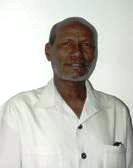
Aden Robleh Awaleh (1941 – 31 October 2014) was a Djiboutian politician and President of the National Democratic Party (PND). He was a member of the National Assembly of Djibouti.
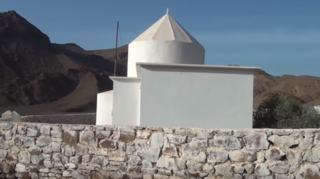
The Issa is a northern Somali clan, a sub-division of the Dir clan family.
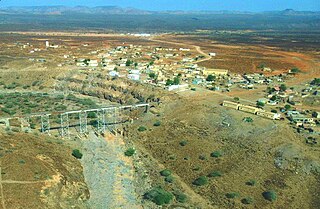
Holhol is a town in the Ali Sabieh Region of Djibouti. It is located 44 kilometres south-west of the capital Djibouti City, at an altitude of 450 metres above sea level. The surrounding area is rich in livestock and fledgling agriculture. It is notable for being the birthplace of Cheik Osman Waiss a nationalist and anti-colonial where he began his movement.

The Djiboutians are the people inhabiting or originating from Djibouti. The country is mainly composed of two ethnic groups, the Somali and the Afar. It has many languages - though Somali and Afar are the most widely spoken ones, Arabic and French serve as the official languages. There is a small Djiboutian diaspora in North America, Europe, and Australia.

Mahamoud Harbi Farah was a Djiboutian politician of Somali ethnicity. A pan-Somalist, he was the Vice President of the Government Council of French Somaliland from 1957 to December 1958, during Djibouti's pre-independence period.
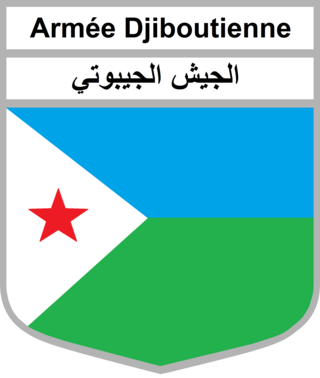
The Djiboutian National Army is the largest branch of the Djibouti Armed Forces and is based in the Djiboutian capital of Djibouti. Djibouti has upgraded its Ground Forces with advanced additions from domestic engineering and modifications. It must operate in mountainous and other rugged terrain, but it must do this without affecting the mechanized capability that is needed to confront regional forces.
The military history of Djibouti encompasses the major conflicts involving the historic empires and sultanates in the territory of present-day Djibouti, through to modern times. It also covers the martial traditions and hardware employed by Djiboutian armies and their opponents.

Association Sportive d'Ali Sabieh/Djibouti Télécom, or simply AS Ali Sabieh or ASAS Djibouti Télécom, is a Djiboutian football club located in Ali Sabieh, Djibouti. It currently plays in the Djibouti Premier League.
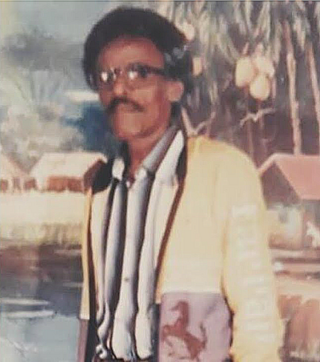
Mohamed Sulayman Tubeec, was a Somali singer, songwriter and record producer. he gained the nickname of " King of Voice."
Nima Djama is a composer and singer from Djibouti. In 1976, Nima Djama sang a famous patriotic tune for Djibouti independence. She is also heavily involved in Djiboutian politics.

Mohamed Ali Fourchette (1950–1992) was a prominent Djiboutian vocalist and instrumentalist.

Abdallah Abdoulkader Abass, (1963–2007) was a well-known Djiboutian songwriter, composer and singer. He remains among the most famous Afar singers in Djibouti. Abdallah had a significant influence on newer generations of Djiboutian musicians in the 1980s and 1990s.

Fadumo Ahmed Dhimbiil was a Djiboutian poet, singer, and songwriter.
Aden Farah Samatar was a well-known Djiboutian songwriter, composer, poet and singer. Aden's art was noted for its emphasis on political justice. He sang for Djiboutian independence during the 1970s with the Arreh Group.















